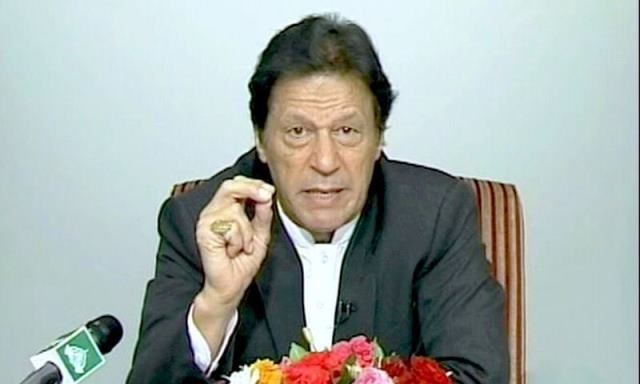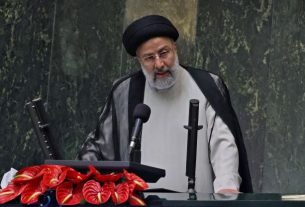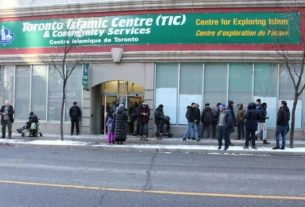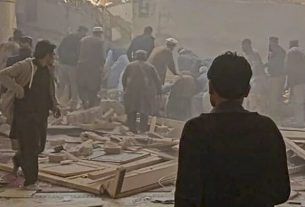The crowds gathered peacefully, jostling outside the home of the man they call the “saviour of Pakistan”, hoping for a glimpse. Two days earlier, these same streets in the city of Lahore had resembled a warzone as tens of thousands of protesters violently took to the streets, ransacking buildings, burning cars, throwing petrol bombs and clashing with police, with several dying from gunshot wounds.
On Saturday, however, there was calm. Late the previous night, former prime minister Imran Khan had finally returned to his home, following some of the most tumultuous days in the country’s recent history that saw him arrested on Islamabad high court premises by 100 paramilitary officers. He was detained for two days but then, to the surprise of many observers, was granted bail and allowed to walk free after his arrest was declared illegal by Pakistan’s supreme court. With Khan released, the violence eased.
The devotion felt towards 70-year-old Khan was evident in the hundreds gathered at his gate. “Khan is the only leader for Pakistan,” said Shaf Ali, 23, an IT worker. “We will protest for Khan again as he is the only hope in Pakistan and he is fighting for us.”
Aftab Ahmed, 18, called herself “Khan’s soldier” before adding: “They have to kill us before arresting Khan again.”
Now free again, at least for the time being, Khan has vowed mass protests on a scale never seen before in Pakistan until general elections, due in October, are called early. If they happen, and Khan is allowed to enter the contest, the consensus is that he would gain an overwhelming victory. The government, meanwhile, has pledged to re-arrest Khan as soon as legally able, indicating that Pakistan’s volatile days are likely far from over.
“Today, our democracy is hanging by a thread,” said Khan in his first public address since his release, describing those who had gone after him as a “mafia”. His speech was not aired on television.
He also stepped up his crusade against Pakistan’s military, who for decades have controlled politics, through coups or backdoor influence, but whom few have ever dared directly criticise for fear of being imprisoned, abducted or killed with impunity. Khan blamed the armed forces chief Asim Munir for ordering his arrest and accused him of being above the rule of law.
Khan had previously been a close ally of the military, coming to power with their tacit support in 2018, though he denies the army rigged his election. But after two years of working closely together, the relationship fell apart and he was removed from office. Since then Khan has accused the military and the government that ousted him of colluding with “foreign powers”, publicly blaming the US government for being involved, which it denied. In Saturday’s speech, he told his followers that the “army chief stabbed me in the back and brought to power Pakistan’s most infamous criminals”.
As he made increasingly provocative allegations against top military figures – the most feared men in Pakistan – accusing them of being involved in international conspiracies and assassination attempts on his life, many felt that Khan was playing with fire. The allegations against him grew, and he now faces almost 100 cases involving corruption, sedition and even blasphemy, and if convicted, would likely be disqualified from politics.
Analysts agreed that the decision to grant Khan bail has emboldened him. His anti-military and anti-west narratives are increasingly popular, as is his representation of himself as a man of the people at a time of economic strife in Pakistan, where inflation is at record highs and several people have died in queues for food rations.
“Khan is the only politician who has challenged the might and the corruption of the military,” said Mohammed Adeel, 24, a student. “The military are only involved in politics so they can make money and get property, it needs to end.”
Yet for all Khan’s bravado, not all are convinced that he truly intends to end the role of the military in politics, given his longstanding relations with the establishment, and suggested he was instead trying to sow division to enable his return to power.
Husain Haqqani, a scholar and former Pakistani ambassador, said Khan was “a populist who is not against the establishment’s worldview; he just wants to control it.”
“Could Imran Khan be taken as a politician believing in civilian supremacy? I doubt it,” said Mustafa Nawaz Khokhar, an influential former senator and former adviser to the prime minister on human rights. “A major part of his political strategy since his ouster has been to make desperate attempts to repair his strained relations with the military.”
Nonetheless, Khokhar said that Khan’s political popularity was unquestionable. “With inflation through the roof and now the judiciary by his side, it is safe to assume that his return to power is certain if elections were to be held. But will the military allow that to happen? Only time will tell.”
For the coalition government, led by the prime minister Shehbaz Sharif, Khan’s release has been a bitter pill to swallow, given claims that they never had such treatment when several members of the opposition were detained for months when Khan was prime minister.
Interior minister Rana Sanaullah, who vowed the government would arrest Khan again, claimed Khan’s objective was to “spread anarchy and chaos” in the country. “Since 2014, he has created a cult,” he said.
Sharif has given the authorities 72 hours to track down all those involved in the violence, which he alleged was “planned and instigated” by Khan. “There is no example of such enmity towards the country and brutality in the country’s history,” the prime minister said.__The Guardian





